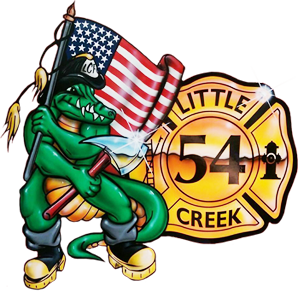Fire Prevention Week 2020
Sunday, October 11, 2020
serve up fire safety in the kitchen fire prevention word search
We miss the ability of going out to the schools, an interacting with the kids. So a few reminder from the members and officers of the Little Creek Vol. Fire Co
Remember to check your smoke detectors, if you don't have any or need to replace them, call the station @ 3026742149 to set up a time to stop by to get a replacement.
In the event of a fire, get everyone out of the house. Have a meeting place away from the house, Call 911 from outside. Remember when calling the 911 center needs the address of the emergency, what the emergency is, if everyone is out of the house. The call-taker at the 911 center will be asking questions that will allow the responders to know what is happening, it is not delaying anything! When the firefighters arrive point them in the direction of the emergency. DON'T GO BACK INSIDE!
Speaking of 911, when you call 911 from your cell phone, we can't automatically see your location. it takes sometimes up to a minute to get the location near the cell phone. When you dial 911 it going to a switching center and routes your call to the nearest (appropriate) dispatch center for your area.
So you called 911, the call taker is going to ask you specific questions, from our scripted protocols, to ensure we ask the right questions to send you the right resources, either police fire or ems.
WHAT IS THE ADDRESS/LOCATION OF THE EMERGENCY? (Without this we don’t know where to send help too!)
WHAT IS YOUR NAME? (So we know who we are talking to)
WHAT IS YOUR PHONE NUMBER? (in case we get disconnected)
TELL ME EXACTLY WHAT HAPPENED? (Tell us why you are calling 911, what is your emergency, why you need police fire or EMS)
After the call taker get those questions asked they'll ask scene or patient specific question for caller and scene safety reasons
Near the end of the call, you'll be given pre-arrival instructions to help you and the victim until help arrives.
Back to fire stuff, If your clothes catch on fire remember to STOP DROP & ROLL in one direction!
When charging your cell phone, ipad or other electric device, don't take it to bed with you, it could overheat and catch fire, and burn you.
Cooking fire safety
When in the kitchen be mindful of hot burners on the stove, or hot items being cooked.
- Keep an eye on what you fry. Most cooking fires start when someone is frying food.
- Watch what you are cooking. Fires start when the heat is too high. If you see any smoke or the grease starts to boil, turn the burner off.
- Make sure you are awake and alert. Alcohol and some drugs can make you sleepy.
- Wear short sleeves or roll them up so they don’t catch on fire.
- Make sure children and pets stay at least 3 feet away from a hot stove.
- Turn pot handles toward the back of the stove so no one can bump them or pull them over.
- Move things that can burn away from the stove. This includes dishtowels, bags, boxes, paper and curtains.
Home hazardous materials
It is important for people to know the steps they can take to keep themselves and their families safe from accidents related to home hazardous materials
Batteries
- Used and “dead” batteries can remain a fire hazard. Place tape over battery terminals before disposal or recycling.
- Replace batteries if they get wet or damaged.
- Keep lithium batteries in a cool dry place.
- Only use lithium batteries designed for the device you want to charge.
- Don't overcharge lithium batteries.
- Don't put lithium batteries in household trash.
Flammable substances
- Only fill portable gasoline containers outdoors in a well-ventilated area. Make sure to place the container on the ground when you fill it.
- Seal and store oil, gasoline, paints, propane and varnishes in a shed away from your home.
- Keep flammable items on shelves away from appliances.
- Keep oily rags in a well-ventilated area and away from heat sources.
- If you have a spill, clean the area and put the containers in a well-ventilated area. If you cannot control the spill, or are unsure about cleanup and disposal, call your local fire department.
Household chemicals
Use
- Follow the instructions on the label when you use household chemicals.
- Don't mix products. This can cause deadly gases or cause a fire.
- Wear gloves or goggles when you use household chemicals.
Storage
- Follow the instructions on the label when you store household chemicals.
- Store household chemicals in their original containers.
- Never store household chemicals that can cause a fire in the sun or near an open flame or heat source.
- Store household chemicals out of the reach of children and pets.
- Use safety locks and guardrails on shelves and cabinets when you store household chemicals. This will prevent them from falling or tipping.
Disposal
- Follow the instructions on the label when you need to throw home hazardous materials out.
- Aerosol cans might contain chemicals that can burn. If you put them in the trash, they can explode or start a fire.
Electrical and appliance fire safety
Clean the dryer filter after each use
- Plug only one heat-producing appliance (such as a coffee maker, space heater, or microwave) directly into a wall outlet at a time.
- Extension cords should only be used temporarily. Have an electrician install additional wall outlets where you need them.
- Never use an extension cord with a heat-producing appliance.
- Don’t overload extension cords or wall outlets.
- Check your electrical cords. If they are cracked or damaged, replace them. Don’t try to repair them.
- Use light bulbs that match the recommended wattage on the lamp or fixture.
- Electrical work should only be done by a qualified electrician
Smoking fire safety
It is important for smokers to know the steps they can take to keep themselves and their families safe from fire.
- Smoke outside. Many things in your home can catch on fire if they touch something hot like a cigarette or ashes. It is always safer to smoke outside.
- Put cigarettes out all the way. Do this every time. Don’t walk away from lit cigarettes and other smoking materials. Put water on the ashes and butts to make sure they are really out before you put them in the trash.
- Be alert. Do not smoke after taking medicine that makes you tired. You may not be able to prevent or escape from a fire if you are sleepy or have taken medicine that makes you tired.
- Never smoke around medical oxygen. Medical oxygen can explode if a flame or spark is near. Even if the oxygen is turned off, it can still catch on fire.
- Never smoke in bed. Mattresses and bedding can catch on fire easily. Do not smoke in bed because you might fall asleep with a lit cigarette.
- Put your cigarette out in an ashtray or bucket with sand. Use ashtrays with a wide base so they won’t tip over and start a fire.
Electronic cigarettes (e-cigarettes)
The main cause of e-cigarette fires and explosions is failure of the lithium-ion batteries.
- Don't charge your e-cigarette with a phone or tablet charger.
- Don't charge your e-cigarette overnight.
- Protect your e-cigarette from extreme temperatures.
- Store loose batteries for your e-cigarette in a case.
- Keep e-cigarettes away from metal objects.
Heating fire safety
Heating is the second leading cause of home fires.
- Install and test carbon monoxide alarms at least once a month.
- Have a qualified professional clean and inspect your chimney and vents every year.
- Store cooled ashes in a tightly covered metal container, and keep it outside at least 10 feet from your home and any nearby buildings.
- Keep anything that can burn at least 3 feet from any heat source like fireplaces, wood stoves, radiators or space heaters.
- Plug only one heat-producing appliance (such as a space heater) into an electrical outlet at a time.
- Never use an oven to heat your home.
- Turn space heaters off when leaving the room or going to bed.
Holiday fire safety
The top three days of the year for home candle fires are Christmas, New Year’s Day, and New Year's Eve.
- Only use decorations that are flame-retardant or not flammable.
- Check holiday lights each year for frayed wires or excessive wear.
- Don’t link more than three strands of holiday lights.
- Never leave a burning candle unattended. Consider using battery-operated flameless candles.
- Keep your live Christmas tree away from heat sources and room exits.
- Water your live Christmas tree daily to keep it from becoming dry.

Views: 1
 Donate
Donate





